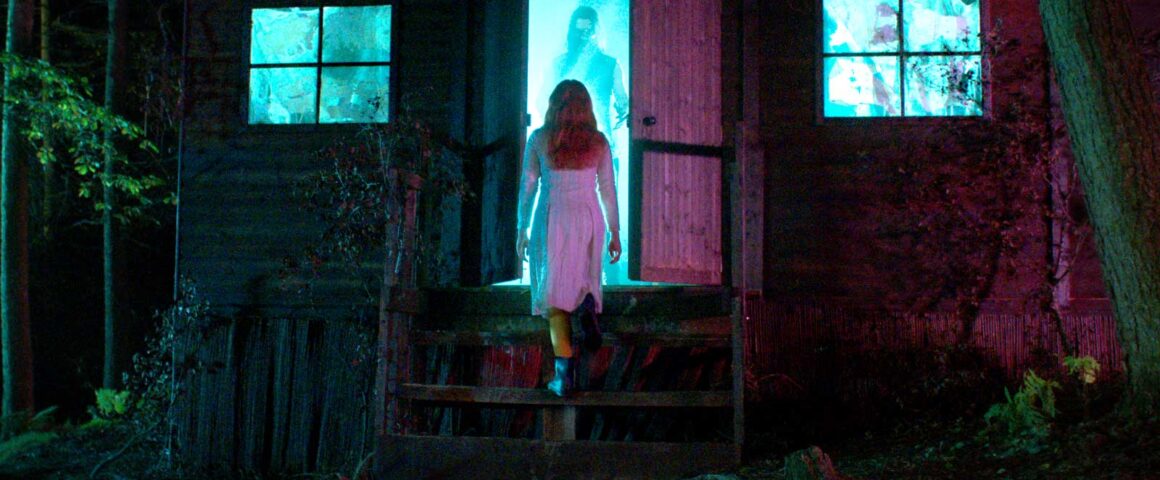Censor is a film that works on multiple levels. It is an enveloping and chilling horror that both disturbs and shocks. It is a meticulous period piece that creates a sense of the past while also treating the politics and attitudes of that period with a sharp satirical edge. It is a brilliantly designed, shot and edited piece of cinema that uses the various elements of film to enthrall, disturb and provoke. And it is a deeply human story of grief, regrets and tragedy, that will linger with the viewer long after the credits have rolled.
Co-writers Prano Bailey-Bond and Anthony Fletcher set their story in 1980s Britain during the Video Nasties scare. This notorious period of British censorship history was one in which many films were cut or banned by the British Board of Film Censorship (BBFC, later renamed the British Board of Film Classification), due to government policy being influenced by public and political concerns that impressionable (read: Lower class) audiences might be inspired by the images they saw. Enid Baines (Niamh Algar, “Wrath of Man”) is the titular censor, one of a team working at the BBFC who identify whether films should be passed, cut or simply rejected. Enid and her co-workers’ days consist of viewing films and identifying possibly harmful material, especially graphic or sexual violence. Enid takes her work very seriously, as she tells her parents, “It’s not entertainment, I do it to protect people.” Enid is also troubled by the childhood disappearance of her sister Nina, who was never found and it is clear that Enid has never gotten past that event. When a new film arrives for inspection, “Don’t Go In The Church,” Enid finds that it resonates with her trauma and subsequently begins a spiraling descent into suspicion, paranoia and the loss of distinction between fiction and reality.
Niamh Algar exquisitely portrays Enid’s development, steadily becoming more disheveled and distressed as the narrative progresses. Algar is utterly mesmerizing, from her self-imposed resetting by rolling her shoulders to her nervous picking at her fingernails. The supporting cast also deliver sterling work, from her button-down parents George (Andrew Havill, “My Cousin Rachel”) and June (Clare Holman, “Waiting For You”) to Michael Smiley’s (“The Nun”) wonderfully sleazy film producer Doug Smart. It is worth noting that button-down and sleazy is how we see these other characters because our perspective is tied so closely to Enid, as though we were looking through her ornate gold-rimmed spectacles. Director Bailey-Bond uses the very fabric of film to take us into Enid’s distorted mind. At some points the editing glitches and the image quality changes, shifting from high quality film to grainy video footage, while Enid’s dreams (or are they?) feature dolly shots that move through the white noise of the TV screen into the horror film scenario. Bailey-Bond also shifts the aspect ratio, narrowing the frame as the film content spills into reality, or reality collapses into the film.
The video images add to the wonderfully evoked period setting, complete with clunky telephones, padded costumes and a grimy presentation of London. Censor performs a de-sentimentalized and critically nostalgic look at the 1980s. From “Stranger Things” to “Atomic Blonde,” the last decade has seen a great deal of nostalgia reminiscing that it was great in the 80s. Censor demonstrates — but crucially never overstates — that the 80s were not great, certainly no more or less than any other decade. A subtle blend of news footage underlies the narrative events, including newspaper reports of violent murders attributed to horror films as well as activist Mary Whitehouse calling for the banning of this “sick filth.” For those who lived through the period, it carries particular recollections of fear over this new material, especially that of video shop owners who dread police raids for possessing banned material. Fear of the state is further emphasized as we also see footage of prime minister Margaret Thatcher calling for unity (i.e., obedience) and the violent police crackdowns on workers striking in protest of government policy. Much hand-wringing over media content while actual social problems are sidelined? Some things never change.
Enid is very much a product of this reactionary time, believing she is doing the right thing while willfully avoiding the actual causes of her problems. A discussion among Enid and her colleagues highlights problems around income and employment, that might be more pressing for the government than horror films, but Bailey-Bond wisely does not overdo this commentary. Another news report in the film’s final moments re-emphasizes the satirical edge of Censor, but much is left ambiguous. What actually happened to Nina? Are the connections between the film Enid viewed and her past genuine or imagined? Can viewing films change you, or do they affect what we already are? These considerations give the film intellectual weight, which is wonderfully balanced with emotion. Much of the best horror is about melancholia and regret, and that is certainly the case here as Enid’s commitment turns to desperation in this tragic tale of grief and trauma. Where Enid finally goes is deeply sad, and gory violence leaves the viewer with possible catharsis but no resolution.



